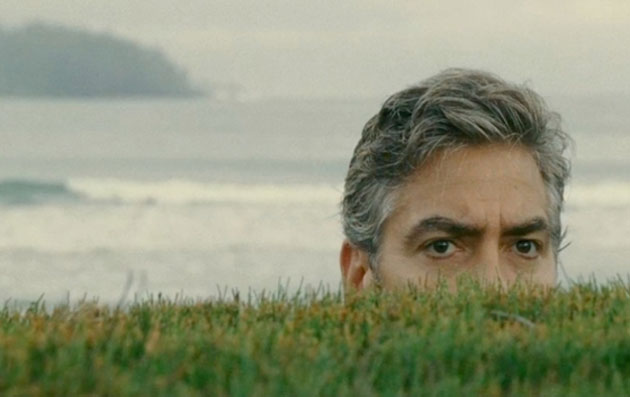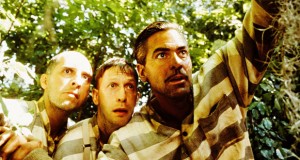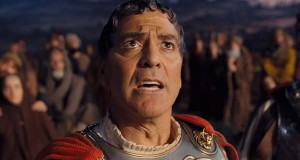The Descendants is a sentimental and bitter sweet new film from Alexander Payne, a director whose work I’ve long admired since I first saw Election back in 1999. I respect the talents of a man who can cast Matthew Broderick, Reese Witherspoon and Chris Klein as the leads in an MTV production and somehow turn it into a smart, subversive and razor sharp satire that draws career best performances out of Witherspoon and Klein.
Since then he has struck gold getting incredible performances out of Jack Nicholson, Paul Giamatti and now George Clooney in his impressive catalogue of films.
Setting aside his debut feature Citizen Ruth, there are some clear recurring themes in his films. Payne’s films are about men coping with failure in their lives. In Election, Matthew Broderick is a teacher facing a midlife crisis whose love/hate relationship with a gifted student leads him to rig a student election. Jack Nicholson in About Schmidt plays a newly retired and widowed man who has little to live for and slowly becomes obsessed with stopping his daughter’s wedding to a moronic car salesman. And Paul Giamatti is a struggling writer in Sideways who is unable to finish his novel and has a failed marriage.
Alexander Payne’s gift is his ability to weave so effortlessly between humour and human drama. He is often sentimental but seldom schmaltzy. He has a knack for creating sad, flawed characters who we like to cheer for, despite their shortcomings. His leading men are the type of people Charlie Brown would grow up to be. They never get to kick the football but you feel sympathy for them, can share in their insecurities and laugh at their indiscressions.
In The Descendants, Payne appears to have created his least relatable lead character. Matt King is a multi-millionaire Hawaiian real estate tycoon played by George Clooney. That sentence alone should be enough to put this man out of the realm of relatability for the rest of us. But as usual, Payne has an unerring knack for humanizing Hollywood stars and that is exactly what he does with Clooney.
We start the film with King’s narration as he introduces us to his life and the crisis he faces. His wife is in a coma after a boating accident and he faces the prospect of putting his work aside and spending time with his two daughters Alex and Scottie. He is daunted at the prospect of being a single parent and isn’t sure how well he relates to his daughters. Scottie is an awkward ten year old who struggles between trying to find her own identity and fitting in with her peers. Alex is the older teen who is going through her own rebellious phase dabbling with drink and drugs.
Matt doesn’t get very far into his new parental responsibilities when Alex drops a bomb – his wife Elizabeth was cheating on him and had planned to divorce him. The scene immediately after sticks in my mind. The sight of a slightly podgy and dishevelled looking Clooney frantically slipping on a pair of sandals and then scampering down the street to his neighbours house in that awkward half run, half walk that you do when wearing sandals and you’re trying not to fall over. Payne shows us this dash to the neighbour’s house in full. It makes Clooney look like a regular guy. Like one of us. It works.
When King confronts his neighbours who confirm the infidelity, he gets a name: Brian Speers. And from there, he has his obsession. To confront this man Brian Speers and do…what exactly? Do something. He takes his two daughters along for the ride, including Alex’s boyfriend Sid, a gormless surfer dude who has a knack for bluntly saying the wrong thing but who is ultimately good hearted and is a calming influence on Alex. There is a trademark in Payne’s films where a character who misbehaves gets a visual reminder of their actions. In Election, Broderick gets a nasty bee sting in the eye after cheating on his wife. In Sideways, Thomas Hayden Church gets a busted nose for a similar indiscresion against his fiancee. And in The Descendants, Sid gets a punch in the face when he can’t contain his laughter after meeting King’s alzheimer afflicted mother-in-law.
There is a secondary story to The Descendants from which the film draws it name. King is a descendant of some wealthy colonialists and is the owner of a large plot of land in Hawaii which is due to be sold to investors as a development property for condos, hotels and casinos. King intends to the defer to the wishes of his many cousins who would all reap the financial benefits of the sale but he also faces opposition from his children and some local residents who don’t want to see the land spoiled and feel that more development would turn their island into a urban rat race.
The impending sale of this land and the gradually deteriorating condition of Elizabeth provide King a moral compass over the course of the film. Of course King is infuriated when he learns of the adultery and wants to make the life of Brian Speers miserable but how long can he afford to stay mad at his comatose wife when she is nearing death? And what good is the money from the landsale? Is it worth placating his cousins if it destroys a natural environment that was enjoyed by his daughters and so many other Hawaiians?
The Descendants is easily Alexander Payne’s most sweet-natured film. Consider that he started with Citizen Ruth, a film about a homeless woman addicted to sniffing spray cans. The Descendants is a film about a family of good people trying to make the best of a bad situation. Their faults and blemishes are not nearly as magnified in Payne’s earlier films and he allows the King family a happy ending. I think this is a natural evolution of most film makers as they get older and more introspective with age. The acerbic tone subsides and is replaced with a milder, gentler tone. The Descendants is not necessarily Payne’s greatest film but it is his most accessible work to date.
Review Overview
RATING
CLASSIC
Summary : Alexander Payne has made a lot of great films and this is just about the best of the lot.
 The FAT Website est. 1999
The FAT Website est. 1999






6dvqnf
qxvdt7